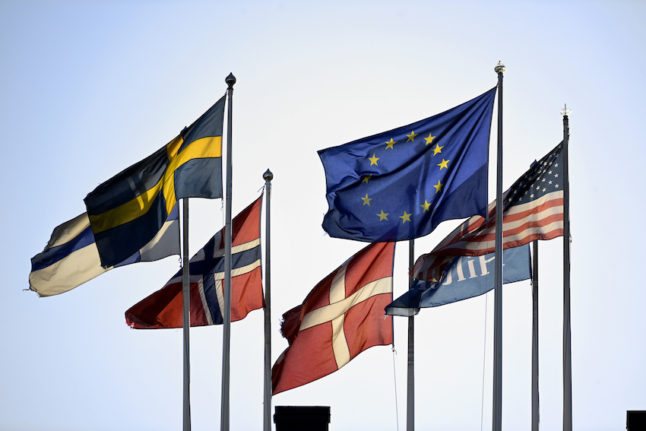A man strongly believed to be Taimour Abdulwahab blew up his car and then himself in a busy shopping quarter of central Stockholm Saturday. He killed only himself, but narrowly missed wreaking havoc among Christmas shoppers.
Abdulwahab had been living in Britain in recent years, where he studied at university, but media reports said he had arrived in Sweden from Iraq as a child, growing up in a small town a three-hour car ride from Stockholm.
The attacks were immediately and widely denounced by Sweden’s Muslim community, with condemnations from many Muslim groups and several small peace protests.
But the clearest message came perhaps on Tuesday, when Hassan Mussa, one of Sweden’s most influential clerics, issued a fatwa — an Islamic ruling — clearly condemning the attack.
“It is forbidden to accept what has happened or try to justify it,” said Moussa.
“Those who accept it or justify it are as guilty as the perpetrator himself,” he added, according to Swedish radio’s translation.
But the fact that a Swedish-raised man blew himself in the name of Islam — as he understood it — has challenged Sweden’s tradition of tolerance, said respected Islamologist Jan Hjärpe.
“This (attack) in Stockholm is used to point to all the Muslims in Sweden and say they are dangerous,” Hjärpe told AFP.
A report released Wednesday by Sweden’s intelligence agency Säpo suggested this kind of extremism was very are: it estimated only about 200 extremists with the potential for violence among the Muslim population.
On that evidence, Hjärpe insisted, they “do not represent the huge majority of the Muslims in Sweden.”
Even the audio message attributed to the bomber, sent out shortly before Saturday’s attack, appeared to acknowledge this lack of radicalism, said Hjärpe.
“You could hear he was quite angry that the Muslims in Sweden were not interested in going into a jihad,” he pointed out.
Prime Minister Fredrik Reinfeldt while condemning the attack, warned against drawing hasty conclusions, and in his comments he stressed the tolerance that underscores Swedish society.
But Malena Rembe, chief analyst at Säpo’s counter-terrorism unit, warned that this tolerance was increasingly being challenged.
With the far-right, anti-immigrant Sweden Democrats entering parliament for the first time after September’s election, the country was moving towards greater polarisation, she cautioned Wednesday.
The increase in Islamophobic rhetoric from the far-right would put Sweden’s tradition for open, tolerant diaologue, under pressure, she warned.
“What we’ve seen in other countries where you have a more polarised debate — where you have more open xeonphobia or Islamophobia — is that it tends to push people into movements because they feel isolated in their own society and they feel included in these extremist environments,” she told AFP.
“An increased polarisation in discussions would perhaps further stigmatise individuals — and stigmatised individuals tend to be recruitable … It is extremely important to ensure a nuanced discussion,” she said.
Just days after Saturday’s attack, the Sweden Democrats called for a parliamentary debate on the problem of Islamic extremism: the other parties rejected the idea, reluctant to let them exploit the situation.
But the reluctance to confront extremist ideas carried its own dangers, said one analyst.
“It’s sort of reflective of the sensitivities of the issues, but also of the consensus nature of Sweden,” security expert Magnus Ranstorp, of Sweden’s defence college, told AFP.
Until recently, even problems surrounding immigration and integration were only marginally debated here, and the far-right’s entry into parliament came as a shock for many people, said Ranstorp, a specialist in Islamist movements.
“By avoiding the debate, you inflate the issues … If you stifle part of the debate it can become more bent up, many issues rolled into one,” Ranstorp said.
“Everyone is tip-toeing around the fire, and therefore you don’t discuss the issue realistically,” he added.
Thus the bomber, despite failing to create the carnage he was aiming for, might have achieved one of his goals.
“I see him as someone who come from the outside (Britain) in here and very deliberately targeted Sweden to create a lot of polarisation, a lot of reaction,” Ranstorp said.



 Please whitelist us to continue reading.
Please whitelist us to continue reading.
Member comments